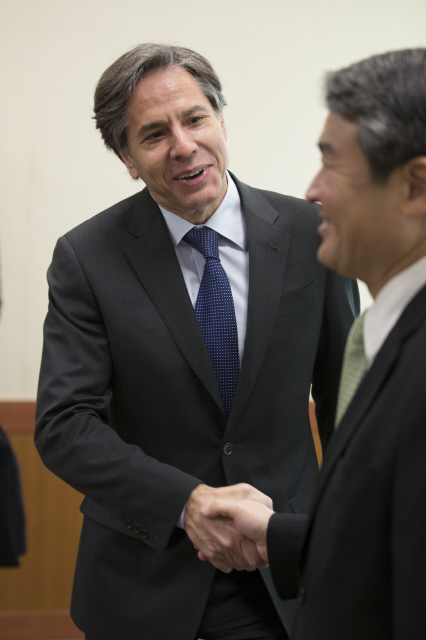 |
US Deputy Secretary of State Tony Blinken greets First Vice Minister of Foreign Affairs Cho Tae-yong at the Central Government Complex in Seoul, Oct. 7. (by Kim Seong-gwang, staff photographer) |
In Seoul, Tony Blinken also emphasizing China‘s role in pushing N. Korea to denuclearize
Tony Blinken, the US Deputy Secretary of State, has emphasized China’s role in deterring North Korean nuclear activity, hinting that if China fails to prevent North Korea’s nuclear weapons program, the US military’s deployment of Terminal High Altitude Area Defense (THAAD), an anti-ballistic missile system, may become a reality for the Korean Peninsula.On Oct. 7, during a forum at the Asan Institute for Policy Studies in Seoul, Blinken was questioned about US intentions to “encircle China” through the Trans-Pacific Partnership (TPP). He responded by saying that the TPP established standards to protect workers, the environment, and intellectual property rights, adding that China is welcome to join if it can meet such standards. Blinken also said that preliminary discussions have also been held with South Korea, and that the US is willing to continue pursuing them.Blinken also warned North Korea to discontinue its nuclear weapons program, but seemed to avoid making any provocative statements. He stated that if North Korea isn’t prepared to discuss denuclearization, the US will not be ready to negotiate, which would make beginning any sort of dialogue difficult. Critics of the foreign policy initiatives of the Obama administration, which is nearing the end of its term, are accusing Obama of becoming complacent after securing a nuclear deal with Iran and reinitiating US-Cuba relations, implying that he plans to leave the difficult issue of North Korea for the next administration to handle. Blinken emphasized China’s responsibility in deterring North Korea’s nuclear program, claiming that, as virtually its sole trading partner, China exercises more influence over North Korea than any other country. He added that convincing China to use its influence over North Korea to initiate dialogue will be “very much at the heart of our agenda” when he begins this three-day visit to Beijing today.Thus, if China fails to taking a leading role in denuclearizing North Korea, the US has strongly implied that it will deploy its THAAD system to the Korean Peninsula if needed, although Blinken didn’t make any direct statements on the matter. Furthermore, Blinken stated that if North Korea continues to refuse to engage in talks or insists on continuing its nuclear tests, the US and its allies will have no choice but to take defensive measures if the North does engage in direct provocation. He said that THAAD is a defensive measure, adding that it‘s the duty of the US to take defensive action against the threat of North Korean missiles and instigations. However, he made it clear that no decision has been made concerning THAAD’s deployment, emphasizing US intentions to pursue thorough dialogue with South Korea.By Kim Ji-hoon, staff reporterPlease direct questions or comments to [english@hani.co.kr]english.hani.co.kr/arti/english_edition/e_international/712004/html



